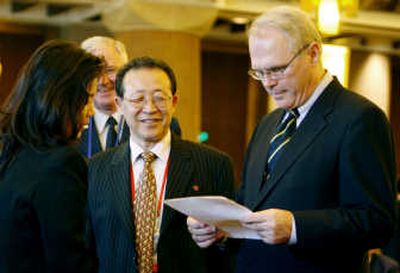Bush taking path he scorned

WASHINGTON – Three years ago this month, President Bush met Democratic challenger John Kerry in a debate and declared that Kerry’s answer on negotiations with North Korea “made me want to scowl.”
Bush said that Kerry was advocating a “naive and dangerous” policy of offering to conduct bilateral negotiations with Pyongyang in parallel with the six-nation talks on North Korea’s nuclear ambitions. “That’s what President Clinton did,” Bush asserted, saying Kerry’s idea would undermine the six-party talks. Clinton “had bilateral talks with the North Korean, and guess what happened? He didn’t honor the agreement.”
If there was any doubt, Wednesday’s announcement in Beijing of a new agreement with North Korea demonstrates how much Bush has adopted the approach he once condemned. The agreement was reached after bilateral negotiations between the United States and North Korea, held in parallel with the six-nation talks, just as Kerry had suggested.
Under the deal, North Korea is to begin disabling its core nuclear facilities at Yongbyon and provide a “complete and correct declaration” of all of its nuclear programs by December 31. In exchange, the United States and North Korea will begin cultural exchanges and move toward a “full diplomatic relationship.”
Citing the results of bilateral talks held between Pyongyang and Washington last month in Geneva, the six-party agreement strongly suggests that the United States will begin to remove the designation of North Korea as a state sponsor of terrorism and end sanctions under the 1917 Trading with the Enemy Act by the end of the year “in parallel with” North Korean actions.
Much of the agreement remained vague, including how extensively the facilities will be disabled and how North Korean claims about its nuclear programs will be verified. Assistant Secretary of State Christopher Hill, the chief negotiator, did not directly answer those questions in a conference call with reporters Wednesday, especially when he was asked whether the United States was poised to lift sanctions against Pyongyang by year’s end.
“We have a very clear understanding with them,” Hill said. Asked to clarify his statement, Hill responded, “A very clear understanding means a very clear understanding.”
Not even recent reports of possible North Korean nuclear cooperation with Syria have delayed the administration’s push for an agreement. In a nod to the concern that North Korea might be supplying materials to Damascus – said to be a factor in an Israeli attack on Syria last month – the agreement says that North Korea “reaffirmed its commitment not to transfer nuclear materials, technology or know-how.”
U.S. officials have suggested that Chinese pressure on North Korea after its nuclear test a year ago had changed the dynamics for negotiations, but Asian diplomats say Bush’s shift is what helped break the deadlock. A Chinese official said this week that China’s role was minimal compared to the U.S. decision to finally engage in bilateral talks.
Some North Korea experts now worry that the administration may be moving too fast. Gary Samore, a former Clinton administration official now at the Council on Foreign Relations, said he was puzzled by the “lack of a process to verify the declaration” of North Korea’s nuclear programs.
He said thorough verification would include looking at samples, reviewing operating records and interviewing scientists – steps North Korea has resisted in the past. “The danger is North Korea may be tempted to get away with a stark declaration,” he said.
“This violates the basic Reagan arms control lesson of ‘trust but verify,’ ” said John Bolton, the former U.N. ambassador who was a top arms control official in Bush’s first term.
One risk, experts said, is that North Korea could decide to pocket the U.S. concessions while failing to actually dismantle its facilities or give up its stash of weapons-grade plutonium.
“The North Koreans are rubbing their hands together” with glee, said Charles Pritchard, president of the Korean Economic Institute and a former negotiator with North Korea for both Clinton and Bush.